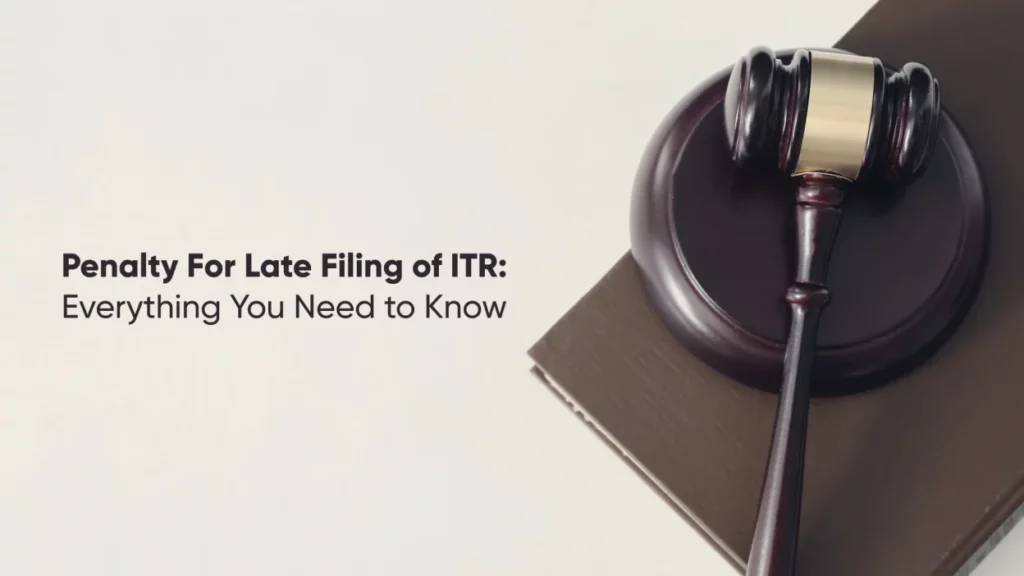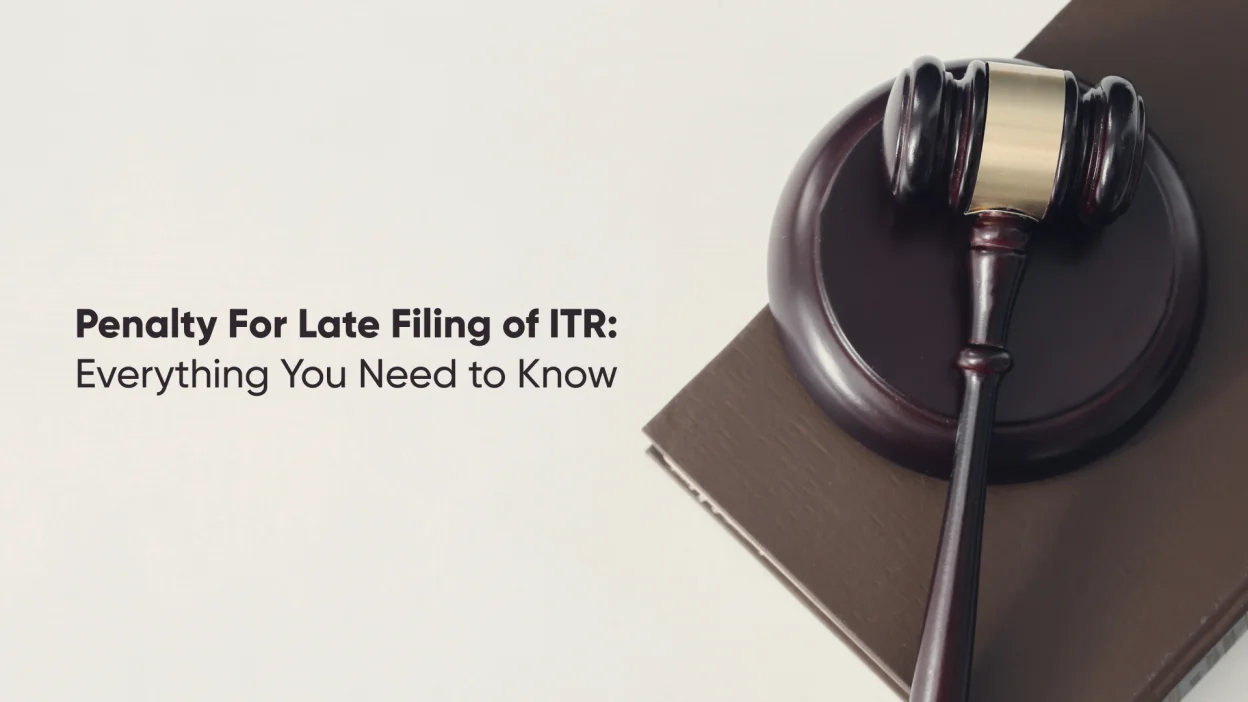Penalty For Late Filing of ITR: Everything You Need to Know

The penalty for late filing of income tax returns is a critical aspect that taxpayers must be aware of to avoid unnecessary financial burdens. Not adhering to the income tax filing deadlines can lead to various consequences, including a penalty for late filing and a late tax payment penalty. It’s essential to stay informed about these penalties to ensure compliance and financial prudence.
In this comprehensive guide, we’ll learn the specifics of the penalty for late filing of ITR, knowing what it means for individual taxpayers and businesses. You’ll learn about the different types of penalties, such as the fine for late tax returns and the income tax late filing penalty, and how they apply based on your filing circumstances.
Table of Contents
ToggleWhat is the Due Date for Filing ITR for FY 2024-25?
Staying aware of the due dates for Income Tax Return (ITR) filing is essential to avoid the penalty for late filing of ITR. In India, the standard deadline for individual taxpayers to file their ITR is July 31st of the assessment year, unless extended by the government. However, for businesses requiring audit reports, the deadline is usually extended to October 31st.
| Taxpayer Category | Due Date | Remarks |
|---|---|---|
| Individuals and HUFs (Non-Audit Cases) | July 31, 2025 | Applies to salaried individuals, pensioners, and those with income from property or investments not subject to tax audit requirements. |
| Businesses Requiring Audit | October 31, 2025 | For companies and individuals whose accounts are subject to audit under the Income Tax Act. |
| Taxpayers with International Transactions | November 30, 2025 | For taxpayers involved in international transactions requiring transfer pricing reports. |
| Belated/Revised Returns | December 31, 2025 | Last date to file belated or revised returns for FY 2024-25 (AY 2025-26). |
What is the Penalty Penalty for Late Filing of ITR After Due Date?
Penalty Under Section 234F: Late ITR filing penalty – ₹5,000 (after 31st July), ₹10,000 (after 31st Dec). If income ≤ ₹5L, max ₹1,000.
Interest Penalty Under Section 234A: If tax dues exceed ₹10K, a 1% monthly interest applies until paid.
Penalty Under Section 271H: Late TCS/TDS filing attracts a penalty between ₹10K – ₹1L, plus a daily fine of ₹200 under Section 234E until filed.
Importance of Timely Income Tax Return (ITR) Filing
Filing your Income Tax Return (ITR) on time is crucial to avoid the penalty for late filing of income tax return, ensure financial compliance, and maintain a healthy credit profile. Timely submission of ITR not only keeps you legally compliant but also enables smoother financial transactions, such as loan approvals or visa applications.
Avoiding Penalties: Timely filing helps avoid the penalty for late filing of ITR, which can be a substantial financial burden depending on the delay duration and your taxable income.
Quicker Refund Processing: If you’re entitled to a refund, filing your ITR on time ensures that the refund process is initiated without delay, providing you quicker access to your funds.
Facilitates Loan and Visa Applications: A history of timely filed ITRs is often required for personal loan approvals and visa applications, serving as proof of income and financial stability.
Avoids Interest on Tax Due: Filing your ITR on time helps avoid additional interest charges on any tax due, as these charges accumulate until the date of filing.
Also Read: Personal Loan Tax Benefits | Tax Deduction & Tax Exemption
Understanding Penalty for Late Filing of ITR
Filing late income tax return can lead to several implications, including the imposition of penalties and legal consequences.
Statutory Basis
The penalty for late filing is mandated by the Income Tax Act in India. This fine for late tax return, which is typically July 31 of the assessment year, unless extended by the government.
Calculation of Late Filing Penalties
The penalty for late filing varies based on the duration of delay and the taxpayer’s income bracket. For instance, a delay beyond December 31 can result in a higher penalty than a delay just beyond the July 31 deadline.
Differentiated Penalties for Individuals and Businesses
The income tax late filing penalty differs for individuals and businesses, reflecting their differing income scales and complexities. Businesses often face higher penalties due to their larger transaction volumes and more complex tax assessments.
Legal Consequences
Apart from monetary penalties, prolonged failure to file an ITR can lead to legal consequences. This might include scrutiny from the Income Tax Department and potential legal actions.
Common Causes for Delayed ITR Filing
Various factors can lead to delayed ITR filing, resulting in the penalty for late filing of income tax returns. Understanding these common causes can help taxpayers take proactive steps to avoid late filing.
Lack of Awareness
Many individuals miss the ITR filing deadline due to a lack of awareness about the due dates or the filing process itself. This is especially common among new taxpayers or those who have recently started earning.
Financial Constraints
Some delay filing their ITR due to financial constraints, particularly if they owe taxes and are unable to arrange the funds by the deadline. This situation often requires careful financial planning or seeking professional advice.
Documentation Issues
Gathering all the necessary documents, like Form 16, bank statements, and investment proofs, can be time-consuming. Missing or incorrect documents can lead to delays in filing the ITR.
Technological Challenges
Technical issues with the online filing system or personal lack of technological proficiency can also cause delays. This is particularly relevant in areas with limited internet access or for individuals not comfortable with digital platforms.
Also Read: Know Difference Between Form 16, For 16A & Form 16B
Impact of Delayed ITR Submission on Taxpayers
Delayed submission of Income Tax Returns (ITRs) can lead to various adverse consequences that extend beyond the immediate penalty for late filing. These repercussions can have long-term financial and legal implications, affecting the taxpayer’s overall fiscal health and compliance record.
Financial Penalties
A penalty for late filing of ITR can range from Rs. 1,000 to Rs. 5,000, depending on the income level and the extent of the delay. This penalty, as per the Income Tax Act, is levied when the ITR is filed after the due date but before December 31 of the assessment year. For those filing after December 31, the penalty is higher.
Legal Ramifications
Prolonged failure to file ITRs can escalate into legal issues. This includes notices from the Income Tax Department, scrutiny of financial records, and potential legal proceedings, which can be time-consuming and damaging to one’s reputation.
Impact on Credit Score
Consistent late filing or non-filing of ITRs can negatively impact your credit score. Lenders often consider your tax filing history when assessing loan or credit applications, and a poor compliance record can lead to difficulties in securing credit.
Loss of Benefits and Deductions
Late filers lose out on certain tax benefits and deductions. For instance, if you file your ITR after the due date, you cannot carry forward certain losses (like business loss or capital losses) to subsequent years, which could otherwise be used to offset future taxable income.
Waiver and Appeals in ITR Penalties
Understanding the process for waiver and appeal against income tax late filing penalty can provide taxpayers with options to mitigate them under certain conditions.
Conditions for Penalty Waiver: A waiver of the penalty for late filing can be requested under specific circumstances, like genuine hardship, natural disasters, or technical issues with the filing system. The taxpayer needs to provide a valid reason and evidence for the delay to be considered for a waiver.
Filing an Appeal Against Penalties: Taxpayers have the right to appeal against the imposed penalties. This involves filing an appeal with the Commissioner of Income Tax (Appeals), stating clear grounds for the appeal and providing supporting evidence.
Documentation Requirements for Appeals: To appeal a penalty, detailed documentation is required, including the original tax return, notice of penalty, and any relevant correspondence with the tax authorities. Additionally, evidence supporting the reasons for the delay, such as medical records or proof of technical issues should be included to strengthen the appeal.
Tips to Avoid Late Filing
To steer clear of the penalty for late filing of income tax returns, incorporating certain practices can ensure timely and efficient filing.
Calendar Reminders and Alerts: Setting up calendar reminders well in advance of the due date for ITR filing can be a simple yet effective way to avoid late filing. Utilising digital calendars or scheduling apps to send alerts a few weeks or even months prior can provide ample time for preparing and filing your return.
Professional Assistance: Seeking help from tax professionals or chartered accountants can significantly reduce the risk of late filing. These experts not only help in timely filing but also ensure accuracy and compliance with tax laws. Their expertise can be particularly valuable for those with complex tax situations or those unfamiliar with tax regulations.
Utilising Technology for Timely Filing: Leveraging online tax filing platforms and software can streamline the process of preparing and submitting your ITR. These tools often provide user-friendly interfaces, step-by-step guidance, and automatic calculations, reducing the time and effort required for filing.
Understanding Applicable Deductions and Credits: Being well-informed about the deductions and credits you are eligible for can simplify and expedite the filing process. Gathering and organising relevant documents related to deductions and credits well before the deadline can ensure a smoother filing experience. This understanding not only helps in timely filing but also ensures that you maximise your tax savings.
Also Read: How to e-Verify Your Income Tax Return
Conclusion
In conclusion, avoiding the penalty for late filing of ITR requires a mix of organisational strategies, professional assistance, and leveraging technology. Being proactive with reminders, seeking expert guidance, utilising digital tools for filing, and understanding tax deductions can transform the daunting task of ITR filing into a manageable and timely process. By adopting these practices, taxpayers can ensure compliance, avoid financial penalties, and maintain peace of mind during tax season.
Frequently Asked Questions
As of 2024, the late filing penalty for ITR is calculated based on the duration of the delay. If filed after the due date but before December 31st 2024, the penalty is Rs. 5,000. For returns filed after December 31st 2024, the penalty increases to Rs. 10,000. However, for small taxpayers with income up to Rs. 5 lakhs, the maximum penalty is Rs. 1,000.
Yes, in addition to the penalty for late filing of income tax returns, interest under Section 234A at 1% per month or part thereof is charged on the unpaid tax amount, from the due date of filing to the actual date of filing.
Yes, the penalty for late filing can be waived under specific circumstances like genuine hardship, natural calamities, or technical issues with the filing portal. Taxpayers need to provide a valid reason and evidence for the delay to be considered for a waiver.
Failing to file your income tax return can lead to a penalty for late filing, potential legal action, and scrutiny from the Income Tax Department. Additionally, it can affect your financial credibility, hindering future loan or visa applications.
You can file a belated return before the end of the relevant assessment year to avoid the penalty for late filing. However, this option is available only up to a certain deadline and may still attract interest charges for the delay.
Exceptions to the penalty for late filing are rare and are typically considered only in extreme circumstances, like severe illness or natural disaster, where the taxpayer can justify the inability to file on time.
Yes, you can revise your return even if you have filed it late, within the prescribed time limit. The revised return can be filed before the end of the relevant assessment year or before the completion of the assessment, whichever is earlier.
The standard due date for filing individual income tax returns in India is usually July 31st of the assessment year. This deadline may be extended by the government under certain circumstances. For businesses requiring audit reports, the deadline is typically October 31st.













